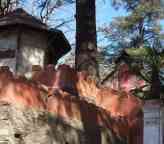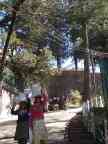
A. O. Hume was born in St Mary Cray, Kent, now a part of Greater London. He was the grandson of an East India Company director, and the seventh child of the radical Benthamite politician Joseph Hume — a Scotsman who had served as a doctor and intelligence officer in India. Naturally, in view of the Bentham connection, the boy was sent to University College School, moving on from there to the East India College, Haileybury. After two years young Hume returned to University College London, this time to the hospital for medical training. He then went out to Calcutta with the Bengal Civil Service.
At first Hume climbed steadily up the career ladder, proving himself altogether worthy of his genetic heritage and liberal background. An energetic, outspoken administrator, he pursued what now seems an admirably enlightened path — for example, introducing free primary school education in Etawah, the town of present-day Uttar Pradesh then under his jurisdiction. By 1870 he had risen to become Director-General of Agriculture in the central government. But he was having problems with his colleagues, and now his reformist policies became more controversial. "Untainted by racism," as Edward C. Moulton so aptly puts it, he again took up cudgels for the rural poor, and was eventually demoted, retaliating by taking the government to task in Agricultural Reform in India (1879). His main contribution to Indian life, however, was in founding the Indian National Congress (INC). He had long sympathized with those who suffered under what he regarded as mistaken policies, and appealed to the graduates of Calcutta University, in an open letter of 1883, to "organise an association for the mental, moral, social, and political regeneration of the Indian people" (Majumdar et al, 881). The idea took off, and after some initial developments the first meeting of the INC was held in 1885. Hume had his supporters, of course, and it is very important to remember that such people existed among the more exploitive sahibs and memsahibs of the British Raj.


Left: The road by Rothney Castle, with his conservatory still standing in the background.
Right: A glimpse of Rothney Castle, Hume's home in Simla, from the gate. [Click on thumbnails for larger images.]
Another of Hume's very real claims to fame is as an ornithologist, for he pursued his hobbies with the same zeal as he pursued his political ideals, and became an outstanding authority on the subcontinent's birdlife. He made many new identifications, and a number of Indian species were given their common names by him (Hume's Babbler, Hume's Bush Warbler and so on). A glance at his standard text, Nests and Eggs of Indian Birds, Vol. I (1889), available at Project Gutenberg, the Internet Archives and elsewhere on the web, shows that many of his fellow-Victorians in India shared this interest, and sent him new specimens for his collection. Part of this legendary collection, which he housed in his hilltop home in Simla in the Himalayan foothills, is now at the Natural History Museum. After finally retiring to England, Hume also founded the educational South London Botanical Institute (1910), which is still thriving. By then, he had long been a vegetarian, and given up collecting birds and their eggs. An important factor in this change, along with the disposal of his documentation by an ignorant servant, had been his interest in Theosophy. Like many of his contemporaries, Hume was deeply drawn to the occult, and had often been visited in Simla by the colourful Madame Blavatsky. His house there, Rothney Castle, was until quite recently the headquarters of the Simla Theosophist Society.
When Hume died at the age of 84 he received many tributes in India, and in 1985 he featured on a series of Indian postage stamps commemorating the founding of Congress. It is only fair to point out though that there is an alternative view of his involvement in Indian politics. By promoting the INC, and serving as its General Secretary, was he not merely trying to provide "the natives" with a harmless channel for their dissatisfactions? This is the view proposed in "A History of Modern India..." (see below). The historian Pamela Kanwar also suggests that the INC provided a "safety valve" for Indian aspirations (75). In the context of everything else that we know about him, as well as of the anger he aroused in the colonial establishment, it seems unlikely that Hume saw it in this way himself. Consider, for example, his poem "The Old Man's Hope" (1886), quoted in the excellent Wikipedia entry on him. Here, after asking the subjugated Indians "Are ye Serfs or are ye Freeman, / Ye who grovel in the shade?" he proclaims rousingly, "In your own hands rest the issues! / By themselves are nations made!"


Hume's grave in Brookwood Cemetery, Surrey, which he shares with his daughter Maria. His inscription is at the top, but it is very worn.
Despite their different eras and settings, A. O. Hume had much in common with that other fiery British radical, William Cobbett, not least his concern for the rural poor, his willingness to take on all-comers, and his love of nature. Fittingly, his ashes were interred at Brookwood Cemetery in Surrey. This is the last resting place of several other distinguished Victorians, and is also known for its wealth of birdlife and beautiful sequoias.
Biographical Note
With regard to A. O. Hume's birth date and place in the family, taken from Moulton's entry in the normally reliable ODNB (see below), it was puzzling to find Joseph Hume's own reference to "the boy, my 7th child" in a letter to Bentham dated 12 October 1826. Perhaps this was an earlier infant who died? See The Correspondence of Jeremy Bentham, Vol. 12, ed. Luke O'Sullivan and Catherine Fuller, Oxford: Oxford University Press, 1968, p. 255. Note also that there is still a Joseph Hume Scholarship for postgraduate work in Laws at UCL, so the Hume family connection with that college continues to this day.
Sources
"Allan Octavian Hume" (a birding site). Viewed 22 July 2013.
"Allan Octavian Hume" (Wikipedia). Viewed 22 July 2013.
"A History of Modern India: The Struggle for Freedom." Viewed 22 July 2013.
"Field Notes: Allan Octavian Hume." Viewed 22 July 2013.
Hume, A. O. The Nests and Eggs of Indian Birds, Vol. 1. Available here.
"Indian National Congress" (a philately site). Viewed 22 July 2013.
Kanwar, Pamela. Imperial Simla.: The Political Culture of the Raj. New Delhi: Oxford University Press, 2003.
Majumdar, R. C., H. C. Raychaudhuri & Kalikinkar Datta. An Advanced History of India. Delhi: Macmillan India, 4th ed., 1978.
Moulton, Edward C. "Allan Octavian Hume (1829-1912)." Oxford Dictionary of National Biography. Online ed. Viewed 22 July 2013.
Last modified 12 March 2008